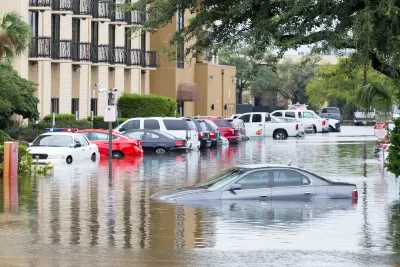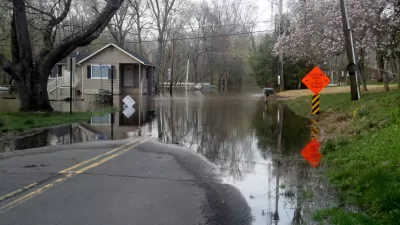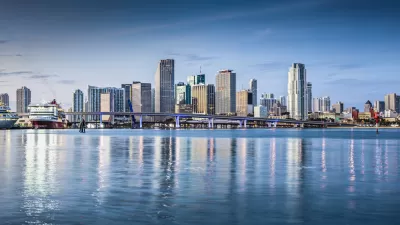A new study from CNBC ranks US states in order of sustainability and preparedness for climate change and extreme weather. A few might surprise you.

As part of its 2024 America’s Top States for Business study, media outlet CNBC has identified the 20 U.S. states most and least prepared for climate change and the extreme weather it brings. Published across two articles (one for the best prepared and one for the least prepared states), reporter Scott Cohn makes the case for why it’s an important topic.
From the increasing number of national disasters (“the National Oceanic and Atmospheric Administration estimates weather and climate disasters in the U.S. did nearly $93 billion in damage last year”) to the fact that we’re all already paying for it (homeowners insurance is “up 27% nationwide since 2021, according to data compiled by online insurance marketplace Insurify,” and not just in states like Louisiana, which are seeing double-digit raises annually), sustainability is no longer a issue for the future. That future is here. Despite this fact, Cohn writes, some of the states that are more vulnerable than others “are not doing all they can to mitigate the risks.”
According to the article, the study weighted infrastructure the heaviest, and sustainability was a major factor in that category’s score. The study incorporated state-level figures from First Street, a flood risk research foundation, “for properties at risk of major damage from flooding, extreme heat, wildfires and wind in the next 30 years” and NOAA data “on extreme weather for the primary geographic regions in which state are situated,” as well as U.S. Department of Energy data on renewable power.
Some of the results, especially on the best-prepared list are surprising, Arizona in particular. The study appears to have weighted flood risk very heavily and, in the article’s analysis at least, glosses over the seriousness of extreme heat. The article reads: “The Grand Canyon State’s intense desert climate can be harsh in its own way, with 645 heat-related deaths last year alone in Maricopa County, home to Phoenix. But at the same time, only about 5% of properties are at risk of flooding.”
So while this study is an interesting lens through which to look at various states’ preparedness for climate change and extreme weather events (of which CNBC doesn’t seem to consider extreme heat one, despite recent calls from state attorney generals for FEMA to classify it as a major disaster), it’s important to keep in mind it was conducted through the lens of sustainability for businesses deciding where to locate their companies, not for the health of communities and the people who live in them.
The lists below are also interesting when considered in context with the analysis of the top 20 cities most and least threatened by climate change published by online insurance marketplace PolicyGenius earlier this year.
10 States Least Prepared for Climate Change and Extreme Weather
1. (tie) Louisiana
1. (tie) New Jersey
3. Connecticut
4. Mississippi
5. Ohio
6. Pennsylvania
7. New Hampshire
9. (tie) Texas
9. (tie) Delaware
10. Maryland
10 States Best Prepared for Climate Change and Extreme Weather
1. Nevada
2. Idaho
3. South Dakota
4. California
5. Colorado
6. Nebraska
7. New Mexico
8. Washington
9. Arizona
10. Oregon
FULL STORY: These 10 U.S. states are America’s least-prepared for climate change and extreme weather

Alabama: Trump Terminates Settlements for Black Communities Harmed By Raw Sewage
Trump deemed the landmark civil rights agreement “illegal DEI and environmental justice policy.”

Study: Maui’s Plan to Convert Vacation Rentals to Long-Term Housing Could Cause Nearly $1 Billion Economic Loss
The plan would reduce visitor accommodation by 25% resulting in 1,900 jobs lost.

Planetizen Federal Action Tracker
A weekly monitor of how Trump’s orders and actions are impacting planners and planning in America.

Waymo Gets Permission to Map SF’s Market Street
If allowed to operate on the traffic-restricted street, Waymo’s autonomous taxis would have a leg up over ride-hailing competitors — and counter the city’s efforts to grow bike and pedestrian on the thoroughfare.

Parklet Symposium Highlights the Success of Shared Spaces
Parklets got a boost during the Covid-19 pandemic, when the concept was translated to outdoor dining programs that offered restaurants a lifeline during the shutdown.

Federal Homelessness Agency Places Entire Staff on Leave
The U.S. Interagency Council on Homelessness is the only federal agency dedicated to preventing and ending homelessness.
Urban Design for Planners 1: Software Tools
This six-course series explores essential urban design concepts using open source software and equips planners with the tools they need to participate fully in the urban design process.
Planning for Universal Design
Learn the tools for implementing Universal Design in planning regulations.
Caltrans
Smith Gee Studio
Institute for Housing and Urban Development Studies (IHS)
City of Grandview
Harvard GSD Executive Education
Toledo-Lucas County Plan Commissions
Salt Lake City
NYU Wagner Graduate School of Public Service





























